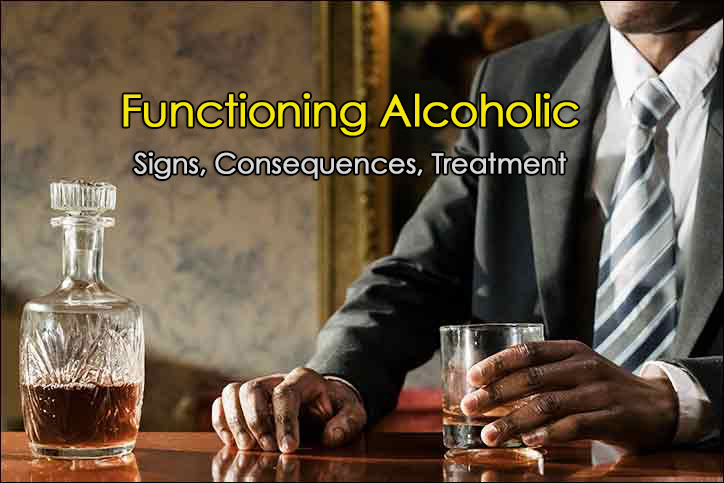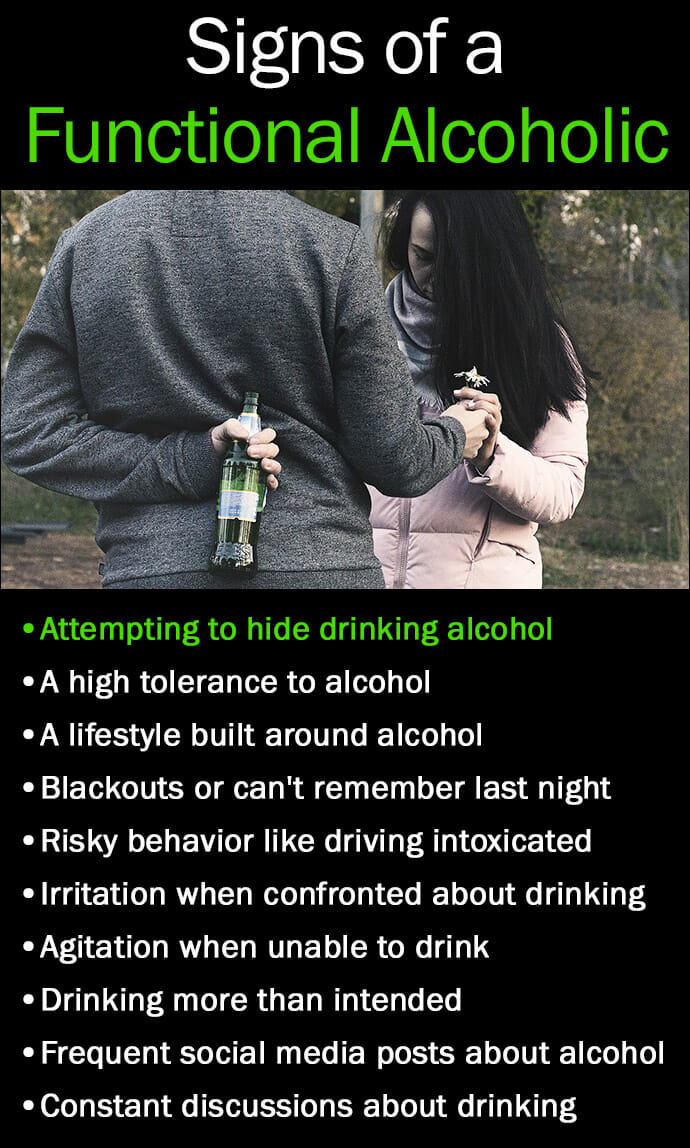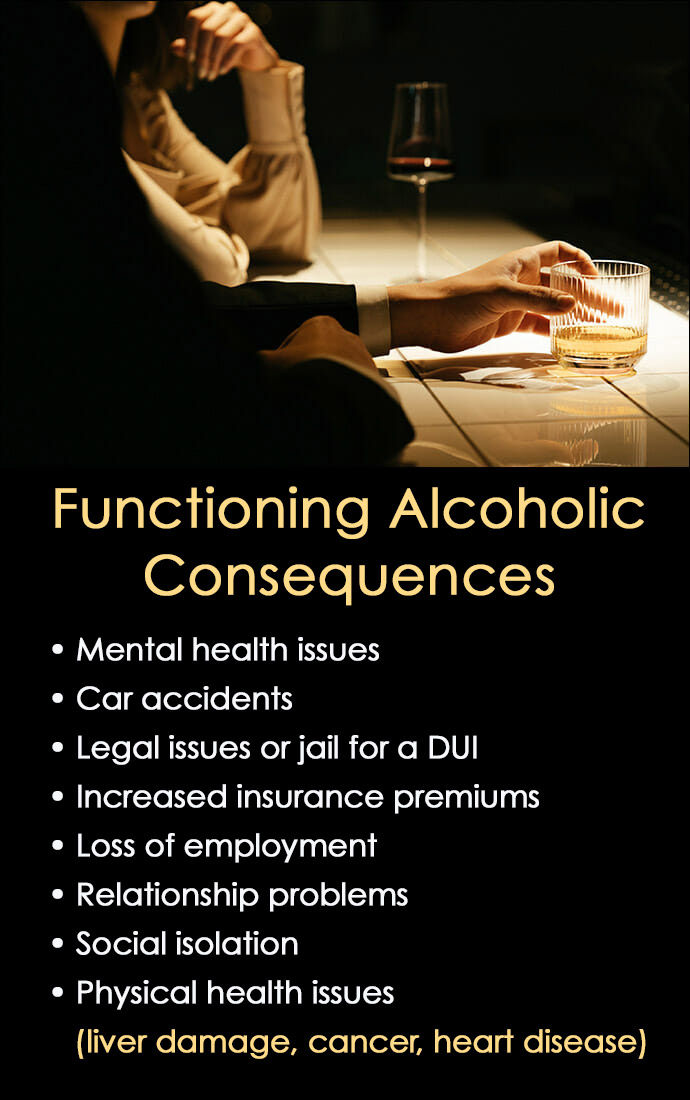Table of Contents
High Functioning Alcoholic is a phrase still widely used by the general public, although the medical and treatment community refer to it as alcohol use disorder instead, which is the diagnostic term to describe a person with an alcohol addiction.
According to the CDC, 25 percent of adults had at least one day in the past year of heavy drinking.
Many people are able to drink somewhat regularly without experiencing any of the negative effects of alcohol. Others have been drinking to extreme levels for years and have suffered with health problems because of it.
Somewhere in between these two groups is a category identified as a functioning alcoholic or a closet alcoholic.
On the surface, these people appear to be able to handle drinking because it hasn’t impacted them in a negative way yet.
What is a Functioning Alcoholic?
Though the phrase is not a diagnostic term, functioning alcoholic, or functional alcoholic, is often used to describe a person whose dependency to alcohol has not yet caused problems in most areas of their social, professional, and personal life.
At the “functioning” stage of their alcohol use, a person rarely misses work, though they may experience a dip in productivity as a result feeling hung over on a regular basis.
Likewise, he or she has usually been able to maintain seemingly good relationships with family and friends.
Despite an outward appearance of health and stability, a functional alcoholic is likely dealing with intense cravings for alcohol, multiple failed attempts to cut back on their drinking, or to quit drinking all together.
In many cases, a person with an alcohol use disorder will eventually lose the ability to stay in a so-called functioning stage of alcohol dependency because the disease of addiction tends to escalate, especially when left unaddressed and untreated.
Signs of a Functioning Alcoholic
Recognizing the signs of a functioning alcoholic, or more precisely someone with an alcohol use disorder, is important for getting help in the early stages of an alcohol addiction or being able to point out potential problems to a loved one or a friend.
It can be difficult for a functional alcoholic to admit he or she has a problem, which is known as denial. This is especially true when a person hasn’t yet suffered with any serious drinking-related consequences.
Still, there are some relatively clear signals that a person may be dealing with an alcohol use disorder.
Signs of a functional alcoholic can include some of the following:
- Drinking alone or attempting to hide the frequency or amount of alcohol and individual drinks – sometimes referred to as a closet drinker or closet alcoholic
- An incredibly high tolerance to alcohol
- A lifestyle, schedule, or social circle built around the consumption of alcohol
- Blacking out or not being able to remember what happened after a period of drinking the evening or day before
- Engaging in risky behavior, such as driving while intoxicated, practicing unsafe sex while inebriated, or drinking while caring for young children
- Becoming irritated when confronted about drinking behavior
- Feeling anxious or agitated when situations change and being unable to drink as planned
- Drinking more than a person originally intended
- Having social media posts that show most leisure time is spent drinking alcohol
- Constantly having discussions about drinking
- Rationalizing alcohol use as being necessary to relax or as a reward for hard work
- Experiencing withdrawal symptoms like headaches or the shakes when not drinking
What’s important to remember is that there is no shame struggling with an alcohol use disorder. While it may feel like something that’s embarrassing or needs to be hidden, because of the social stigma often attached, it is a very treatable condition.
Consequences of Functional Alcoholism
Many people battling functional alcoholism are often dealing with undiagnosed or untreated mental health issues, such as depression, anxiety, post-traumatic stress disorder, or other issues.
Regular or excessive alcohol consumption is one way many people unwittingly self-medicate the symptoms of these problems.
Left untreated, the problems faced by a functioning alcoholic may increase because long-term alcohol use makes the symptoms of mental illness worse, causing a cycle of drinking more to feel better.
For some people who begin drinking without any mental health issues, excessive or long-term alcohol use changes the function and structure of the brain as addiction occurs.
These brain changes can lead to depression, anxiety, or other mental illness conditions that were absent before regular alcohol use.
The combination of addiction and mental illness combined is known as a co-occurring disorder and requires dual diagnosis treatment for recovery from both conditions.
Other Functioning Alcoholic Complications
- Mental health issues
- Car accidents
- Legal issues or jail for a DUI
- Increased insurance premiums
- Loss of employment
- Relationship problems
- Physical health issues (liver damage, cancer, heart disease)
- Social isolation
As the cycle continues, real-life drinking problems, such as DUIs, losing employment, or having relationship issues will begin to manifest very quickly, making life even more chaotic and unmanageable.
Excessive drinking over time, even if it seems manageable and under control can lead to negative health issues such as liver damage, wet brain, cancer, heart disease and others.
Many times, physical and mental health conditions from alcohol use may develop slowly, so a person doesn’t know they are happening until the issue becomes serious, and then it may be too late to correct.
Seeking treatment for functional alcoholism should begin before any negative health symptoms appear.
Functioning Alcoholic Treatment
A residential alcohol treatment program may be necessary to address many of the challenges faced by a functioning alcoholic in the same manner as those with a more serious alcohol use disorder.
Treatment for functional alcoholism usually needs to start with alcohol detox in a safe, medically monitored facility that can help individuals move through withdrawal symptoms in the most comfortable manner possible.
For most individuals, alcohol detox will generally last for 7 to 10 days depending on the severity, and may only take 3 to 5 days for some people.
An inpatient, supervised detox will ensure the patient is safe and comfortable, and fully completes the detox process instead of quitting if things become too difficult and begin drinking again.
Detoxing from alcohol should never be done at home alone because withdrawal can be dangerous. The most serious form of alcohol withdrawal is known as Delirium Tremens (DTs), and can cause seizures or even be fatal.
After detox is completed, a formal treatment program tailored to a person’s specific needs will address the underlying causes and drivers of alcohol addiction, including any issues with depression, anxiety, or other mental health problems.
Alcohol addiction treatment usually includes one-on-one counseling, group sessions, and family counseling. All of these are incredibly useful for understanding the reasons a person has been drinking and to help them fully engage in the recovery process.
Therapeutic approaches like Cognitive Behavioral Therapy (CBT) help people develop skills that address and change negative thought patterns and behaviors.
Others such as Relapse Prevention Therapy teach ways to avoid triggers and cravings that can derail sobriety and cause a person to begin drinking again.
Though it can be difficult for those considered to be a functional alcoholic to envision life without drinking alcohol regularly, many others before them have recovered successfully.
It is challenging to seek help and work through the program, but it is worth the reward of living a happy, healthy, and productive life in recovery from an alcohol use disorder.
Functioning Alcoholic FAQs
What are the stages of a functioning alcoholic?
There are generally four stages in the life of a functional alcoholic: early, middle, late, and crisis stage.
In the early stage, an individual uses alcohol as a way to manage stress, anxiety, or relax at the end of the day. They are able to completely fulfill all responsibilities.
During the middle stage, drinking continues and a tolerance develops so a person drinks more alcohol to feel the same effects. This is the time when a person begins hiding alcohol use or makes excuses for drinking.
In the late stage, physical or mental health issues may begin to appear. Some people begin to fall behind with normal responsibilities and negative consequences like accidents or legal issues from driving while intoxicated become a problem.
When the crisis stage occurs, it becomes difficult to hide the drinking problem. Some people lose their jobs, relationships fall apart, and health issues become serious.
If a person hasn’t hit rock bottom yet, they might in a very short time. This is a clear sign that seeking help is necessary.
What are some excuses high functioning alcoholics use to validate drinking?
- I need a drink to unwind after a stressful day
- I deserve a drink for finishing a big work project
- I can stop drinking anytime I want
- I only have alcohol on the weekend
- I only drink in social settings
- Drinking wine is good for my heart
How does functioning alcoholism affect relationships?
As functioning alcoholism worsens, it can strain relationships between friends, coworkers, people who are dating, spouses, children, and can cause some of the following:
- Emotional distance
- Lack of intimacy
- Communication problems
- Trust issues
- Mood swings
- Personality changes
- Neglecting responsibilities
- Codependent behaviors
- Financial hardships
- Health problems
Drinking alone or isolating from others creates an emotional distance and communication problems. Trust fades. Mood swings and personality changes make it difficult to be around problem drinkers.
Neglecting responsibilities around the home becomes a burden for the family, and when it occurs at work it can lead to job loss and financial insecurity.
How can I encourage a high-functioning alcoholic to seek help?
It’s never easy to ask a person to get help for drinking too much, but many times it is the only way they will recover.
First, do research about treatment centers and various programs to find the best fit before discussing the issue. Ask doctors and friends if they have any recommendations.
Understand ahead of time that it may get ugly before it gets better. Always have a conversation when the person is sober and be open and honest about how it is affecting them and everyone around them.
Let them know you care about them, and you know they care about everyone it is affecting. Give them examples of how drinking is hurting them as well as others.
Always remain calm, and if the subject escalates to an argument, take a step back and let them know you care.
Emphasize you are concerned for their wellbeing and will provide all the support they need when they are ready to discuss it further.
Be patient but persistent. When the time is right, try talking about it again.
If necessary, speak with a professional counselor or treatment center about staging an intervention. Hopefully it won’t go that far, but sometimes it is the only way to get help for a functioning alcoholic.





